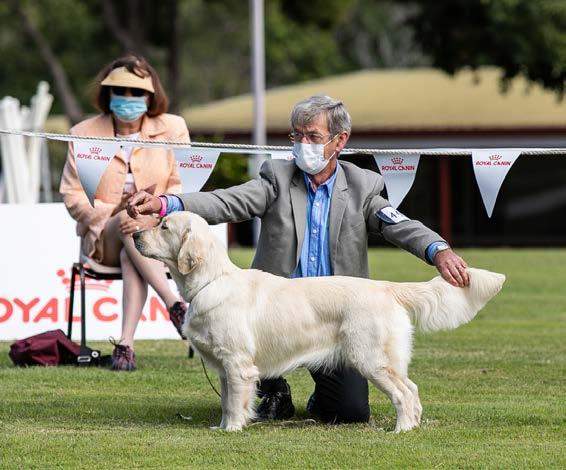
4 minute read
How To Love And Survive Your
How to love and survive your teenage dog – AND KEEP YOUR SANITY!
Like humans, all dogs go through a teenage phase. Their brain is wired for exploration and they are physically in their prime – with energy to spare!
In her new book How to Love and Survive Your Teenage Dog, Delta Institute qualified dog trainer Barbara Hodel shows how you can successfully cope through this challenging life stage, improve your relationship with your teen dog, keep your sanity and even have some fun!
Contrary to puppy training, there is little information on teenage dog behaviour and training, says Barbara, who is also president of the Pet Professionals Guild of Australia (PPGA).
“Dogs – depending on their breed – become teenagers as early as 7 to 8 months and reach maturity around 24 to 28 months. In this period, they can show incredibly challenging behaviours that often go to the core of our relationship,” she says. “They pull like steam trains, don’t come back when called, get stroppy with other dogs, create their own jobs like digging up the yard or eating the pool lights, they startle easily, test boundaries, bark, chew a lot and are very emotional, just like human teenagers.”
Dogs who don’t come back put themselves and others at risk, pulling dogs are hard to take out and their emotional reactions (eg lunging and barking at ‘strange’ things or people) can be considered aggressive, Barbara explains.
“They behave like this because their brain is still under construction and they don’t assess situations properly. Humans also take it personally if their dog does not behave in a socially acceptable way and that can be to the detriment of the relationship,” she says.
Many pet owners believe puppyhood is the most challenging time and are not prepared for adolescence, she adds.
“Science is just starting to confirm that teenage dogs are challenging and with no science-based, humane and ethical information on how to deal with them, they might end up in the backyard, in rescue or worse, euthanised at an early age!” she said. “With the right attitude, additional socialisation, training and a good sense of humour, we can get through the teenage phase and have fun with our challenging dogs!”
Barbara’s book is a complete guide to your teenage dog, covering everything from brain development, emotions, best practice training and training tips on how to do it.
“We need to focus on developing a trusting relationship, keep them mentally and physical active and have an open line of communication. We then need to teach them to be calm and think before lashing out, and teach them some foundation ‘obedience’ behaviours, such as paying
Barbara top ‘pawrenting’ tips for teen dogs: • Keep socialising your dog. Meet new people and dogs, go to new places and have new and positive experiences on an ongoing basis.
Attend a well-run training class for teenage dogs where you will get support. • Do not over-exercise. Your dog will just be physically exhausted, but the brain still cannot settle.
Mental stimulation is important. Teach your dog something new regularly, such as tricks, a new sport or brush up on obedience skills. And play with them!
Provide enrichment, such as food dispensing toys, puzzles and chews. Make sure you give them time to sniff by hiding their toys or treats in the backyard and let them sniff on walks.
Use positive reinforcement / rewards-based methods instead of aversive or punishment- based techniques, like yelling and hitting.
Be consistent with your dog’s education and make sure everyone is enforcing the same rules.
Reward your dog’s efforts with treats, praise and interaction.
“Most important is to stay connected, show them that you love them and keep socialising and training your dog! If your dog shows aggression, get professional help with a qualified positive reward-based trainer,” says Barbara.
Dogs Queensland in partnership with Barbara Hodel are giving away three copies of her book ‘How To Love And Survive Your Teenage Dog’
To be in the running to win a copy, email barbara@gmail.org. au with your name, address, membership/phone number and tell us your teenage dog stories.
Winners will be drawn on Thusday 1 October 2020 and notified by phone.
• Transcervical insemination with fresh, chilled and frozen semen. • Semen collection and freezing. • In-house progesterone testing - results in 20 minutes. • Dog and bitch fertility assessment and much more.





Dr Scott Norman BVSc PhD DACT Registered specialist - veterinary reproduction Dr Jennifer Larsen BVBiol BVSc Ph (07) 3204 4332 1474 Anzac Ave Kallangur 4503
Est 1977 “ HOT FOIL STAMPING SPECIALIST ” PHONE: ( 02 ) 47741809

EMAIL: marellen@marellenshowribbons.com ADDRESS: 109 Silverdale Rd Silverdale N.S.W. 2752
WEB: www.marellenshowribbons.com “ FIND US ONFACEBOOKFORFAST COMMUNICATION ”








